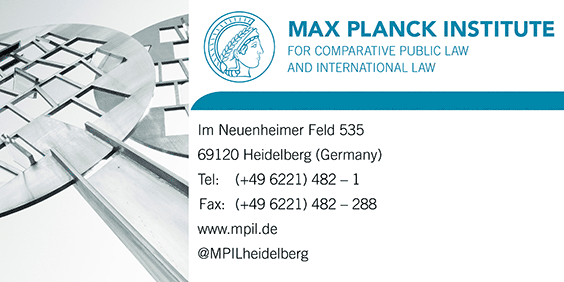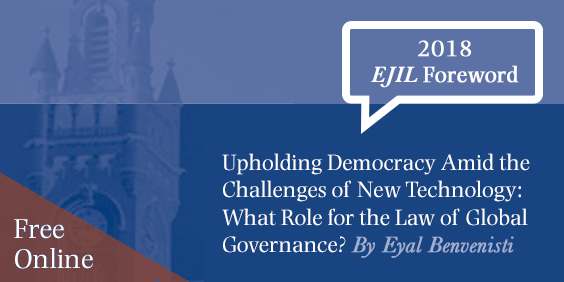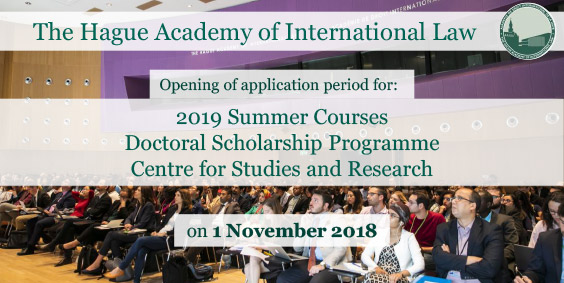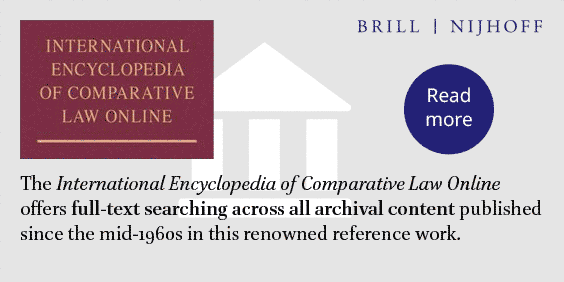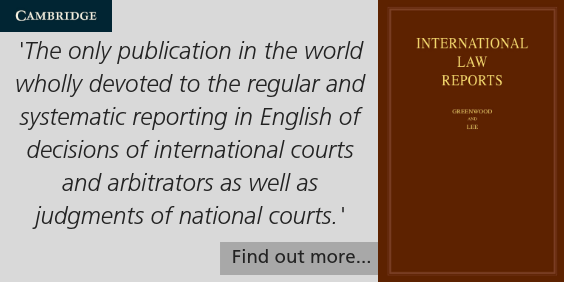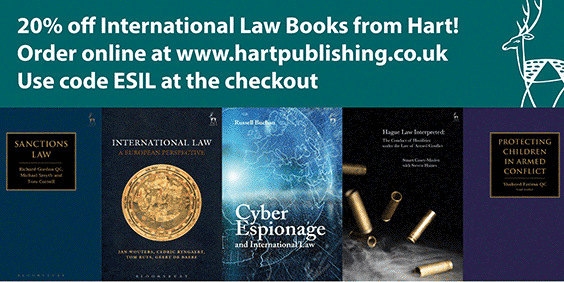ESIL Newsletter: October 2018
 In this issue
In this issue
- President’s Message: From Manchester to Göttingen
- Guest Editorial by Ata R. Hindi – On the international lawyer and jurist working on Palestine and Palestinian people
- Report from Manchester
- 2019 Research Forum, Göttingen
- 2019 Annual Conference, Athens
- Other ESIL Events
- New Publication in the ESIL Book Series
- ESIL SSRN Series
- ESIL Reflections
- News from Interest Groups
1. President’s Message: From Manchester to Göttingen

Luis M. Hinojosa-Martínez
The 14th ESIL Conference held at the University of Manchester (13-15 September), organised by the Manchester International Law Centre (MILC), was a complete success both in terms of attendance and the high scientific level of the speeches and debates. The Society is indebted to Jean d’Aspremont, Iain Scobbie and the rest of MILC team for their efficiency and for the enjoyable nature of the event that also included a rock concert and a visit to Old Trafford. Almost 500 participants benefitted from vigorous discussions, prestigious keynote speakers, and the privilege of hearing a conversation full of wisdom between Philip Allott and Rosalyn Higgins skillfully moderated by Iain Scobbie.
Seven members were elected at the Manchester General Assembly to join the Board for the next four years: Christina Binder (University of Munich), Paolo Farah (West Virginia University), Gleider Hernandez (Durham University), Photini Pazartzis (National & Capodistrian University of Athens), Evelyne Schmid (Université de Lausanne), Ramses Wessel (University of Twente) and Ganna Yudkivska (Judge at the European Court of Human Rights). In addition, Pål Wrange has been coopted to the Board as the head of the organizing team of the 2020 ESIL Conference that will take place in Stockholm and Joanne Scott has been coopted as the person responsible for liaison with the European University Institute. Our Society can be proud of this geographical diversity and of the fact that for the first time in its existence women are in the majority on the Board. The new Board held its first meeting immediately after the conference and are working together on a wide range of ESIL activities and initiatives.
We are able to welcome these new members because other members who have served the Society for several years have ended their mandates as Board members. This Society is indebted to them and I wish to thank them all for their generous and able work to improve ESIL. I am referring to André Nollkaemper (former President), Marko Milanovic (former Vice-President and Secretary-General), Basak Cali (former Secretary-General), Nehal Bhuta, Jean d’Aspremont, Mary Footer and Mario Prost.
The next big ESIL event will be the 2019 ESIL Research Forum at the Institute for International Law and European Law at Göttingen University on 4-5 April 2019. The theme of the Forum is ‘The International Rule of Law and Domestic Dimensions: Synergies and Challenges’, a subject that may generate profound theoretical debates while at the same time raising topical life issues. This debate is of particular concern in Europe because of the extremist winds hitting many European countries, but it touches upon a universal tendency that may change how we think and how we are governed. It seems appropriate to revise whether we can (still) speak of a rule of law at the international level as a concept inherent to democratic regimes and to the respect for human rights. New readings of the concept of rule of law are questioning this symbiosis and sometimes present the international rule of law as an anti-democratic concept, when ultra-nationalism disguised as the defence of sovereignty and even democracy questions some of the constitutional elements of the international legal order. The Call for Papers for this event ended on 30 September and the selection procedure will allow us to formulate the programme this autumn.
An email will be sent to all ESIL members soon when ESIL’s Teaching Corner becomes operative. This new section of our website will enable ESIL members to share their teaching materials if they so wish. We hope that you will fill what will begin as an almost empty box and turn it into a useful tool that facilitates teaching and learning in the various fields of international law.
I would also like to remind members that the first two volumes of the European Society of International Law Series are already available. This collection includes selected papers reaching a high level of excellence and presented at ESIL events. The first volume, bringing together some of the papers presented at the 2015 ESIL conference in Oslo, is entitled ‘The Judicialization of International Law. A Mixed Blessing?’ and has been edited by Andreas Follesdal and Geir Ulfstein. The second volume of the Series, edited by Anne van Aaken and Iulia Motoc, deals with the ‘European Convention on Human Rights and General International Law’ following the very successful ESIL-ECtHR joint event in Strasbourg in 2015.
The 2019 membership campaign will be launched in November with the renewed fee structure introduced last year to facilitate the engagement of internationalists from low- and middle-income countries with the Society. Please help us to disseminate information about the new fees among your colleagues in such countries.
I am looking forward to meeting you at a future ESIL event,
Luis M. Hinojosa-Martínez
hinojosa@ugr.es
2. Guest Editorial: On the international lawyer and jurist working on Palestine and Palestinian people

by Ata R. Hindi, PhD Candidate in Law, Tilburg University
I am constantly reminded of the challenges faced when working in international law with respect to Palestine and the Palestinian people. This is not an attempt to negate the efforts of international lawyers and jurists working in or on that context. It is more a call for reflection – to truly consider the extent to which they are able and willing to work without adverse political and personal considerations and censorship of legal writing and advocacy.
Many have been brilliant, principled, and understanding. Others find the need to advise Palestinians about what is best for us when we disagree and stand ground with our legal research, analysis, and positions. I would like to note a few examples of these challenges and hope that this will also resonate with those lawyers and jurists who have worked on similar legal issues in other contexts.
In calling for an end to the occupation, removing settlements, the right of return for Palestinian refugees, and so on, we have been asked to be more “practical”. We have been told that pursuing justice and accountability through the International Criminal Court (ICC) would hurt the Court’s work elsewhere, or that it would be detrimental to the “peace process”. We have been told that working on the United Nations Human Rights Council-mandated settlement business database, and advocating for its public nature, would alienate States and companies. We have been told that analyzing legal paradigms such as racial discrimination and apartheid would be harmful to our work. We have been told to refrain from issues that are “politically sensitive” – not challenging the legal weight of those issues. This advice comes from those who seem more concerned with their careers or with the uncomfortable position of confronting States, donors, international organizations, companies, and other parties – rather than engaging in quality and impactful legal research, writing, and analysis.
From an academic perspective, there are also numerous challenges. There were serious and valid concerns about the holding of the ESIL Research Forum at the Hebrew University, without due consideration for Palestinians. There were similar concerns about holding the 2017 International Committee of the Red Cross conference, in coordination with the same institution, on the 50th year of the occupation, also without due consideration. We continue to question legal analysis and research which favorably cites the authority of a complicit Israeli High Court of Justice. In our own personal academic endeavors, we are told not to use Palestine as a case, study, because we are Palestinian. Our law faculties and students suffer from a lack of funds, partnerships, and other opportunities, no matter how much we pursue them. Instead, our law faculties and students, and those who support them, are punished for taking principled positions.
There is much to be discussed in this context, and perhaps that will be more appropriate for a longer academic piece. For now, I refer to Prof. Andrea Bianchi’s piece in the March 2017 ESIL Newsletter (at para. 3). Palestine and the Palestinian people have placed the bar high, particularly considering developments in the International Court of Justice, the ICC, and elsewhere. These precedents will greatly influence the work of international human rights and humanitarian lawyers for years to come in other contexts.
Palestinian contributions to international law have proven to be principled, fearless, and progressive – particularly in the current global climate. For the international lawyer and jurist working on issues related to Palestine and the Palestinian people, it is expected that their contributions are equally if not more principled, fearless, and progressive, especially when speaking from a position of privilege.
3. Report from Manchester
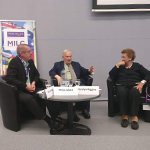
The 14th Annual Meeting of the European Society of International Law took place in Manchester on 13-15th of September under the auspices of the Manchester International Law Centre. The European Society of International Law returned to the United Kingdom eight years after the memorable conference held in Cambridge. 430 participants attended the six fora, twelve agorae and three plenary sessions and engaged with the theme ‘international law and universality’. Highlights included a discussion with Hilary Charlesworth and Christine Chinkin, the Melland Schill lecture by Jan Klabbers, the Gillian White lecture by Laurence Boisson de Chazournes, and a discussion between Philip Allott and Rosalyn Higgins (see picture) as well as a dinner at Old Trafford and a rock concert. All plenary sessions were introduced by PhD fellows of the Manchester International Law Centre. Many thanks to Jean d’Aspremont and Iain Scobbie, as well as their efficient team, for what will be remembered as an original and inspiring event.
4. 2019 Research Forum
The 2019 ESIL Research Forum will take place on Thursday 4 and Friday 5 April 2019 at the Institute for International Law and European Law, Faculty of Law, University of Göttingen, Germany. The Research Forum is a small and intensive scholarly conference that promotes engagement with research in progress and targets early career scholars. On Wednesday 3 April 2019, ESIL Interest Group events will take place in Göttingen on the occasion of the Research Forum.
The 2019 Research Forum addresses the topic: ‘The rule of law in international and domestic contexts: synergies and challenges’. The contemporary international legal order contains a number of elements that might be seen as representing an ‘international rule of law’ in a broader or ‘thick’ sense. For decades, the constant progress of the international rule of law has been taken for granted, supported by an apparently mutual reinforcement between the rule of law at the domestic and international levels. However, the recent backlash against international law, as well as current domestic developments, put the rule of law to the test at both levels. It prompts us to revisit and perhaps reconsider the concept and its relevance. Further information.
5. 2019 Annual Conference
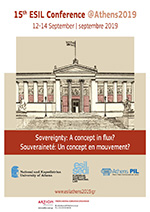
Preparations are already under way for the 15th ESIL Conference on 12-14 September 2019, organized by the Athens Public International Law Center – Athens PIL, Faculty of Law, National and Kapodistrian University of Athens.
The theme is ‘Sovereignty: A concept in a state of flux?’ The many facets of sovereignty and the multiple challenges it faces will form the backbone of the Conference to be further developed in six fora. More recent developments will provide the subject-matter for the various agorae, while the programme will also include proposals submitted by the ESIL interest groups. The Call for Papers and IG panel proposals is now open; the deadline is 31 January 2019.
6. Other ESIL Events
All ESIL members are warmly invited to contact the Board with any proposals for joint events to be arranged with the Society, or to ask for ESIL sponsorship for events that they are organising. Details of how to organise events in collaboration with the Society can be found on the website.
Future joint events currently in the pipeline are the ESIL-ELTE Law School event in Budapest next May (Attribution, Causality and Evidentiary Rules), the ESIL – CJEU symposium in Luxembourg next June (Adjudicating the International Responsibility of the EU), as well as the fourth joint conference at the European Court of Human Rights towards the end of 2019.
The next ESIL-sponsored event will be held in mid-November at the Lauterpacht Centre of the University of Cambridge (Rethinking Reparations in International Law).
7. New Publication in the ESIL Book Series
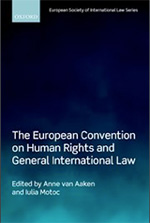
Volume 2 of the ESIL Series has just been published:
The European Convention on Human Rights and General International Law Edited by Anne van Aaken and Iulia Motoc (OUP 2018)
The European Court of Human Rights is one of the main players in interpreting international human rights law where issues of general international law arise. While developing its own jurisprudence for the protection of human rights in the European context, it remains embedded in the developments of general international law. However, because the Court does not always follow general international law closely and develops its own doctrines, which are, in turn, influential for national courts as well as other international courts and tribunals, a feedback loop of influence occurs. This book explores the interaction,
including the problems arising in the context of human rights, between the European Convention on Human Rights and general international law. It contributes to ongoing debates on the fragmentation and convergence of international law from the perspective of international judges as well as academics. Some of the chapters suggest reconciling methods and convergence while others stress the danger of fragmentation. The focus is on specific topics which have posed special problems, namely sources, interpretation, jurisdiction, state responsibility and immunity.
8. ESIL SSRN Series
The ESIL SSRN Paper Series features papers presented at ESIL Events (Annual Conferences, Research Forums, and Interest Groups events). The latest publications include the Jerusalem Research Forum 2018, the Naples Annual Conference 2017 and the Granada Research Forum 2017.
Papers from the Manchester Annual Conference may be submitted until 1 November 2018.
Publication in the ESIL Series enables authors to disseminate their work widely and reach broader audiences without the usual delays involved in more traditional means of publication. The current SSRN serial editors are Pierre d’Argent, Photini Pazartzis and Christina Binder. Further information. Or in case of enquiries: esil.ssrn@gmail.com
9. ESIL Reflections
ESIL Reflections offer up-to-date reflections on current issues in international law. The Reflections are now in their sixth year, covering a wide range of topics relating to current developments in international law and practice as well as theoretical reflections in a way that is relatively accessible to non-experts. The aim is to foster discussion between ESIL members and international law scholars and practitioners more generally – in Europe, but also beyond. ESIL Reflections are published monthly on this website and distributed freely to ESIL members.
The editors are Samantha Besson, Jean d’Aspremont (editor-in-chief), Jan Klabbers and Christian Tams. ESIL Members who have an interest in contributing are encouraged to do so. Please contact Jean d’Aspremont if you would like to contribute.
Latest publications:
- International Law, Universality, and the Dream of Disrupting from the Centre by Jean d’Aspremont
- Diasporas and International Law by Larissa van den Herik
- Sustainable Development Goal 6 as a Game Changer for International Water Law by Catherine Brölmann
- The Codification of the International Law Applicable to Cyber Operations: A Matter for the ILC? by François Delerue
10. News from Interest Groups
ESIL Interest Groups are a vital part of the Society’s success and activities. A list of the groups is available on the ESIL website. Reports of recent activities and upcoming events are available in the full text of the Newsletter.
International Business and Human Rights
The Workshop organised by the Interest Group on International Business and Human Rights at this year’s ESIL Annual Conference in Manchester was a success. The Members attending the workshop had the opportunity to hear about the latest developments in the field of Business and Human Rights and to network with colleagues from many academic institutions. In the coming weeks, the Coordinating Committee will announce new events and initiatives for the benefit of our members, including the organisation of a Panel back–to–back to the UN Forum on Business and Human Rights in Geneva on 26 – 28 November 2018. Please check the website of the Interest Group for more information.
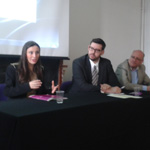 International Biolaw
International Biolaw
The meeting of the IG on International Biolaw in Manchester (September 2018) had two panels:
The first panel on “International Organizations, Biolaw and Universality” (see picture), moderated by José Manuel Sánchez Patrón, with contributions byAndrés Bautista-Hernáez,“Legislative or Political Body? The Contribution of the General Assembly to the Development of International Disaster Law” and Simona Fanni,”Theorizing the Role of the Baxter Paradox in the Possible Evolution of International Biolaw”.
A second panel on “International Courts, Biolaw and Universality”, moderated by Justo Corti Varela, with contributions byJosé Manuel Sánchez Patrón “Dignity versus Universality: the Contribution of the InterAmerican Court of Human Rights”, and Ilja Richard Pavone “The Role of the Strasbourg Court and the Biomedicine Convention in Shaping a Common European Bioethics”.
International Economic Law
On 12 and 13 September, the ESIL IG on International Economic Law held in Manchester the annual workshop on “International Economic Law in 2018: Between Reform and Contestation” before the opening of the 2018 Manchester ESIL Conference. The event gathered scholars from all over the world discussing the most recent developments in international trade and investment law, with a final roundtable on the crisis and reform process of the WTO system.
The IG will soon publish a call for papers on the new generation of EU free trade agreements to organize a full-day event on 3 April 2019 in Göttingen within the Göttingen ESIL Research Forum. It will also organize, beyond the traditional workshop at the Athens ESIL 2019 Conference (12 September 2019), other international Conferences in Moscow (Autumn 2019) and, together with the ASIL IEL IG, in Ravenna / Bologna on the WTO Reform Process (first week of December 2019).
History of International Law
The History of International Law Group held its pre-conference workshop in Manchester on “Consumers or Producers of international law? Non-European experiences with the law of nations in comparative perspective”. We discussed three papers: Lys Kulamayadil’s take on the Bandung Conference and NIEO, Aiko Nakai’s views on ‘Latin American International Law as the First Regional International Law’ and Aleksandr Vodiannikov’s “Intermarium” theory on legal history between the Black Sea and the Baltic. Further details.
The Group is organising a workshop just before the research forum on 3 April 2019. The theme is ‘The rule of law and international law in historical perspective’: We welcome all contributions, especially if they discuss the development of international legal thinking over time based on primary source research. See the Call for papers (deadline: 30 November).
 Law of the Sea
Law of the Sea
The Interest Group on the Law of the Sea organised a business meeting and workshop entitled ‘International Law of the Sea and Universality’ at the ESIL 2018 pre-conference Interest Group events in Manchester on 13 September. Anthi Koskina, Gabriela Oanta, and Jessica Schechinger were introduced as the new co-convenors (Maria Gavouneli continues to serve) (see picture), before four interesting presentations were given by Anthi Koskina and Valérie Wyssbrod (in French), and Amber Rose Maggio and Eduardo Jiménez Pineda (in English). Discussants were Maria Gavouneli and Gabriela Oanta. Many thanks to the presenters and all other participants! Please follow us @esil_lawsea.
